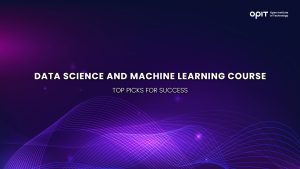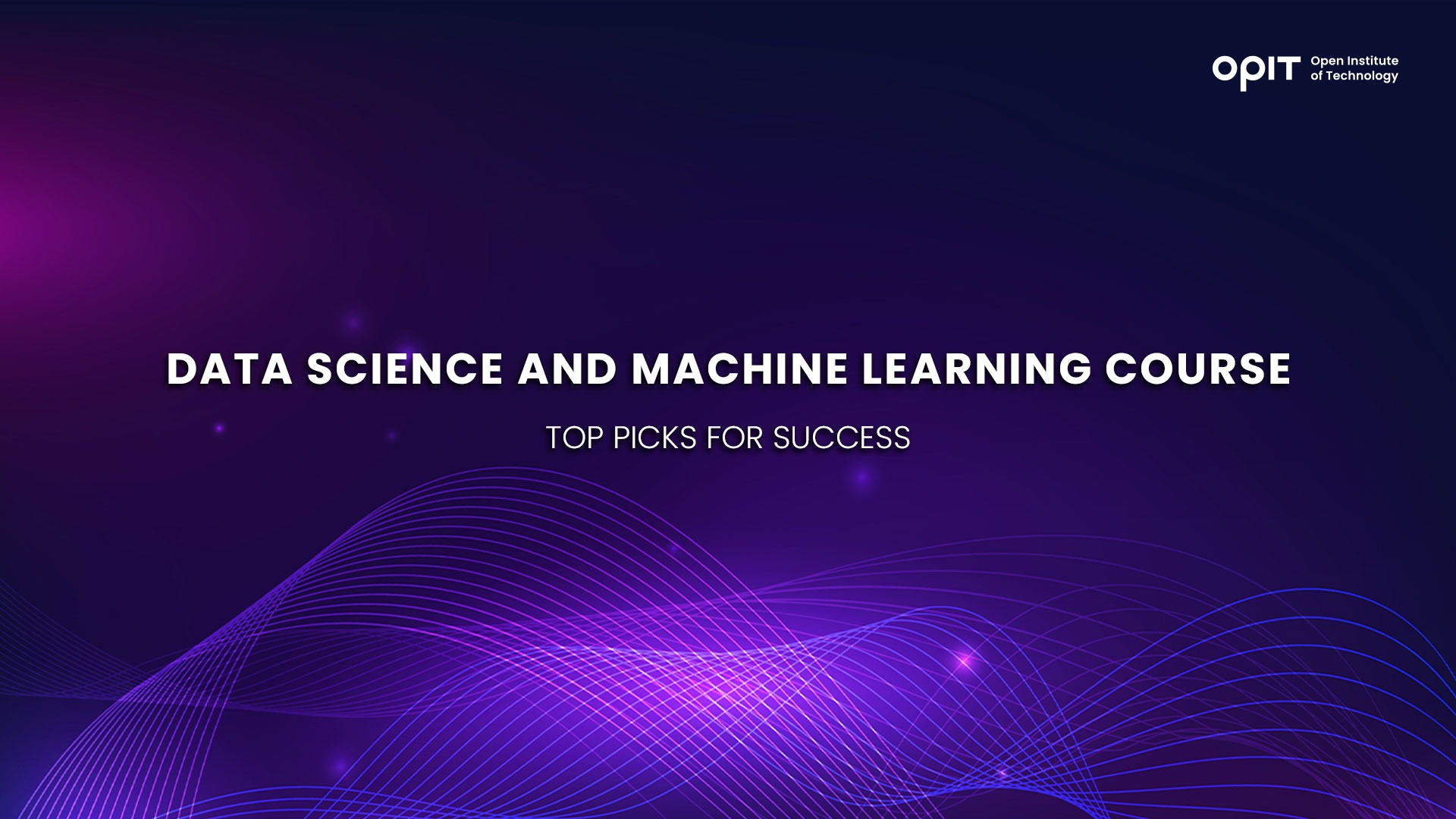

As the world becomes increasingly data-driven and computing power advances beyond all expectations, two intriguing fields are at the center of attention – data science and machine learning.
These fields are often grouped together as they have numerous contact points. First and foremost, both areas are all about data. But data science primarily focuses on extracting valuable insights from data, while machine learning aims to use the data to make predictions and decisions without explicit programming.
These revolutionary technologies have seeped into (and revolutionized) virtually every existing sector: healthcare, business, finance, retail, IT, and the list can go on and on. So, no wonder companies are constantly seeking highly skilled professionals in these fields.
If you’d like to build a career in these highly lucrative fields, improving your skills and knowledge is an absolute must.
Luckily, nowadays, you don’t have to leave your home to achieve this level of expertise. Just pick a data science and machine learning course from this list (or do all three!), and you’ll be well on your way toward a bright future in these burgeoning fields.
Top Data Science and Machine Learning Courses
Whether you’ve just started to dip your toes in these fields or want to take your skills to the next level, you’ll find the perfect data science and machine learning course on our list.
Data Science: Machine Learning by Harvard University
The first data science and machine learning course on the list is classified as an introductory course. In other words, it’s ideal for beginners.
The course first tackles the basics of machine learning, gradually digging deeper into popular algorithms, principal component analysis, and building recommendation systems. You’ll finish this course with fundamental data science and machine learning skills.
The class lasts eight weeks and is entirely self-paced. The recommended time commitment is two to four hours per week, but every learner can tailor it to their needs. Another great option is auditing this data science and machine learning course for free. But you’ll have to pay a fee for a verified certificate and unlimited access to the materials.
The $109 (a little over €101) cost is a small price for the theoretical and hands-on knowledge you’ll gain after this course.
Unfortunately, not everyone will be given a chance to gain this knowledge. Due to some licensing issues, this course isn’t available for learners in Iran, Cuba, and Ukraine (the Crimea region). Another potential downside is that the class is a section of a nine-part data science program. And most of those nine parts precede this course. Although not obligatory, the program creators recommend taking these courses in order, which can be too much time and financial commitment for some learners.
Machine Learning, Data Science, and Deep Learning With Python by Udemy
Do you feel like you need more hands-on experience in machine learning and data science? Have you had to pass on promising job applications because you don’t meet the listing requirements? If you’ve answered positively to both questions, here’s some good news. This data science and machine learning course was custom-made for you.
And no, these aren’t empty promises à-la infomercials you see on TV. This course covers all the most common requirements big-tech companies seek in data scientist job listings. Implementing machine learning at a massive scale, making predictions, visualizing data, classifying images and data — you name it, this course will teach it.
Naturally, this is the single most considerable advantage of this course. It will give you the necessary skills to successfully navigate the lucrative career paths of data science and machine learning. But this only goes if you already have some experience with coding and scripting. Unfortunately, this course isn’t beginner-friendly (in terms of Python, not data science), so not everyone can take it immediately.
Those who do will enjoy over 100 on-demand video lectures, followed by several additional resources. For a $119.99 (approximately €112) fee, you’ll also receive a shareable certificate and full lifetime access to the course.
Data Science and Machine Learning: Making Data-Driven Decisions by MIT
The last item on our list is a big-league data science and machine learning course. The word “course” might even be an understatement, as it’s closer to an entire learning program encompassing a broad set of educational activities.
For starters, the course involves a mentorship program with leading industry experts as guides. And this isn’t a one-and-done type of program either; you’ll have weekly online meetings in small groups. The course itself is taught by MIT faculty and industry experts with years of experience under their belts.
In 12 weeks, you’ll significantly grow your data science and machine learning portfolio, examine numerous case studies, acquire valuable knowledge in applying multiple skills (clustering, regression, classification, etc.), and receive a professional certificate to prove it.
The only notable downside of this extensive data science and machine learning course is its price. With a $2,300 (around €2,142) fee, this course is far from accessible for an average learner. However, those who can afford it should consider it a long-term investment, as this course can be a one-way ticket to a successful career in data science and machine learning.
Factors to Consider When Choosing a Course
Online learning platforms have democratized the world of learning. Now, you can learn whatever you want from wherever you are and at whatever pace works best for you.
But keep in mind that this goes for instructors as well. Anyone can now teach anything. To avoid wasting your time and money on a subpar course, consider these factors when choosing the perfect data science and machine learning course.
Course Content and Curriculum
First things first: check what the course is about. The course’s description will usually contain a “Curriculum” section where you can clearly see whether it delves into topics that interest you. If you have experience in the field, you’ll immediately know if the course spends too much time on skills you’ve already mastered.
Course Duration and Flexibility
Most online courses are self-paced. Sure, this kind of flexibility is mostly a good thing. But if you lack discipline, it can also be detrimental. So, before starting the course, check its duration and make sure you can fully commit to it from beginning to end.
Instructor Quality and Expertise
A data science and machine learning course will undoubtedly contain portions some learners might perceive as challenging or tedious. If there’s one thing that can help them breeze through these parts, it’s an engaging and personable instructor.
So, before committing to a course, research the instructor(s) a little bit. Check their bios and play a video to ensure their teaching style works for you.
Cost and Return on Investment
A data science and machine learning course can cost upwards of thousands of dollars. To ensure you’ll get your money’s worth, check how well it will prepare you for finding a job in the field.
Does it come with a highly requested certification? Does it cover the skills your future employers seek? These are just some of the questions you should consider before investing in a data science and machine learning course.
Hands-On Experience and Real-World Projects
This is another factor that can make investing in a data science and machine learning course well worth it. As valuable as theory is, hands-on experience is king in these fields. Working on real-world projects and building a rock-solid portfolio opens up new doors for you, even before leaving the course.
Networking Opportunities and Job Placement Assistance
A strong support system and direct contact with instructors and mentors should be a course must-have for anyone interested in a data science and machine learning career. Meet notable figures in the industry and stand out among the course goers, and incredible job opportunities should follow suit.
Tips for Success in Data Science and Machine Learning Courses
You can get straight to learning after selecting the perfect data science and machine learning course. Sure, closely following the curriculum will help you gain the necessary knowledge and skills in these fields. But following these tips while studying will do wonders for your future career prospects:
- Develop a strong foundation in mathematics and programming: This will allow you to take more advanced courses and breeze through the rest.
- Stay up-to-date with industry trends and advancements: Despite being updated frequently, the courses can barely keep up with the innovations in the field.
- Engage in online forums and communities for support and networking: Sharing ideas and receiving feedback can help you overcome learning challenges.
- Practice your skills through personal projects and competitions: Challenge yourself to go beyond the scope of the course.
- Seek internships and job opportunities to gain real-world experience: Besides looking great on your resume, these will help you get the hang out of things much quicker.
Learn, Practice, Excel
A carefully selected data science and machine learning course is an excellent opportunity to enter these booming fields with a bang. Developing data science and machine learning skills further will help you stay there and enjoy a successful and rewarding career for years to come.
Related posts

Source:
- EFMD Global, Published on July 12th, 2024.
By Stephanie Mullins
Many people love to read the stories of successful business school graduates to see what they’ve achieved using the lessons, insights and connections from the programmes they’ve studied. We speak to one alumnus, Riccardo Ocleppo, who studied at top business schools including London Business School (LBS) and INSEAD, about the education institution called OPIT which he created after business school.
Please introduce yourself and your career to date.
I am the founder of OPIT — Open Institute of Technology, a fully accredited Higher Education Institution (HEI) under the European Qualification Framework (EQF) by the MFHEA Authority. OPIT also partners with WES (World Education Services), a trusted non-profit providing verified education credential assessments (ECA) in the US and Canada for foreign degrees and certificates.
Prior to founding OPIT, I established Docsity, a global community boasting 15 million registered university students worldwide and partnerships with over 250 Universities and Business Schools. My academic background includes an MSc in Electronics from Politecnico di Torino and an MSc in Management from London Business School.
Why did you decide to create OPIT Open Institute of Technology?
Higher education has a profound impact on people’s futures. Through quality higher education, people can aspire to a better and more fulfilling future.
The mission behind OPIT is to democratise access to high-quality higher education in the fields that will be in high demand in the coming decades: Computer Science, Artificial Intelligence, Data Science, Cybersecurity, and Digital Innovation.
Since launching my first company in the education field, I’ve engaged with countless students, partnered with hundreds of universities, and collaborated with professors and companies. Through these interactions, I’ve observed a gap between traditional university curricula and the skills demanded by today’s job market, particularly in Computer Science and Technology.
I founded OPIT to bridge this gap by modernising education, making it affordable, and enhancing the digital learning experience. By collaborating with international professors and forging solid relationships with global companies, we are creating a dynamic online community and developing high-quality digital learning content. This approach ensures our students benefit from a flexible, cutting-edge, and stress-free learning environment.
Why do you think an education in tech is relevant in today’s business landscape?

As depicted by the World Economic Forum’s “Future of Jobs 2023” report, the demand for skilled tech professionals remains (and will remain) robust across industries, driven by the critical role of advanced technologies in business success.
Today’s companies require individuals who can innovate and execute complex solutions. A degree in fields like computer science, cybersecurity, data science, digital business or AI equips graduates with essential skills to thrive in this dynamic industry.
According to the International Monetary Fund (IMF), the global tech talent shortage will exceed 85 million workers by 2030. The Korn Ferry Institute warns that this gap could result in hundreds of billions in lost revenue across the US, Europe, and Asia.
To address this challenge, OPIT aims to democratise access to technology education. Our competency-based and applied approach, coupled with a flexible online learning experience, empowers students to progress at their own pace, demonstrating their skills as they advance.
Read the full article below:

Source:
- The European, Summer 2024 Edition, Page 24
With careful planning, ethical considerations, and ensuring human oversight is maintained, AI can have huge market research benefits, says Lorenzo Livi of the Open Institute of Technology.
By Lorenzo Livi
To market well, you need to get something interesting in front of those who are interested. That takes a lot of thinking, a lot of work, and a whole bunch of research. But what if the bulk of that thinking, work and research could be done for you? What would that mean for marketing as an industry, and market research specifically?
With the recent explosion of AI onto the world stage, big changes are coming in the marketing industry. But will AI be able to do market research as successfully? Simply, the answer is yes. A big, fat, resounding yes. In fact, AI has the potential to revolutionise market research.
Ensuring that people have a clear understanding of what exactly AI is is crucial, given its seismic effect on our world. Common questions that even occur amongst people at the forefront of marketing, such as, “Who invented AI?” or, “Where is the main AI system located?” highlight a widespread misunderstanding about the nature of AI.
As for the notion of a central “main thing” running AI, it’s essential to clarify that AI systems exist in various forms and locations. AI algorithms and models can run on individual computers, servers, or even specialized hardware designed for AI processing, commonly referred to as AI chips. These systems can be distributed across multiple locations, including data centres, cloud platforms, and edge devices. They can also be used anywhere, so long as you have a compatible device and an internet connection.
While the concept of AI may seem abstract or mysterious to some, it’s important to approach it with a clear understanding of its principles and applications. By promoting education and awareness about AI, we can dispel misconceptions and facilitate meaningful conversations about its role in society.
Read the full article below:
- The European, Pages 24 to 26.
Have questions?
Visit our FAQ page or get in touch with us!
Write us at +39 335 576 0263
Get in touch at hello@opit.com
Talk to one of our Study Advisors
We are international
We can speak in:


